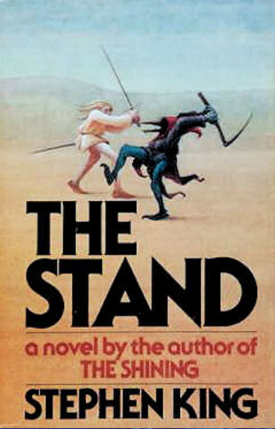Posted: July 6, 2022
The Stand

It is a feat to have a long novel sustain one's attention and "The Stand" does just that. The delight is in the details.
Long ago, when I was in my teens, I read The Stand. I have no recollection of the story whatsoever except of some sense that it was a desolate tale that had a supernatural antagonist.
And now I have picked it up again and have discovered a masterful story. I have to confess that I pre-judged this book. It was better than I expected, much better.
The only thing that could possibly cause me to hesitate re-reading it is its size: 1,300+ pages. Still, I ask myself, how come I can dare read a book this long and still be intimidated by War and Peace?
Maybe you live in a city, like me, and sometimes fantasize about wide open spaces and less people or even no people. If you do then the post-apocalyptic setting of The Stand is something that you'll like. A deadly supervirus has broken out and all but a handful of people are left alive. They live in a world that has a surplus of manufactured goods. No more money needed. If you want something, go inside the store and just take it. There are too few people that everything you used to buy is free.
One other thing about The Stand that I really like is its American character. This novel is a piece of Americana. It immerses you in its many details on what it is like to live and think like an American. To Americans, I suppose, this novel appeals because of its familiarity. To a foreigner like me it appeals because it gives me an intimate glimpse of a culture different from my own.
We follow the stories of a handful of characters: Stu Redman, a factory worker from Texas; Nick Andros, a deaf-mute wanderer; Tom Cullen, an autistic; Frannie Goldsmith, the all-American girl archetype, Harold Lauder the typical nerd, Glen Bateman the sociologist and many others. Some of these characters created by King are extremely engrossing because of their weirdness, like Trashcan Man and The Kid.
All of the aforementioned characters are immune to the plague and they move about a post-apocalyptic United States. Most of them start having common dreams. They dream of a dark man, Randall Flagg, and a old black woman, Abigail Fremantle. In King's fiction these two figures stand for the polar opposites: evil and good. And most everybody who is left in the United States gravitate to one of these key figures.
Towards the end of the book the confrontation between these antagonistic forces make up the title of the book. It is Mother Abigail who moves her forces to make "a stand" - the Stand.
The beauty of this book is in the details, and throughout the course of more than a thousand pages King dishes them out: descriptions, short tales, lessons on sociology and spirituality, references to other books. One of my favorites is about how the act of "going into the wilderness" with its prerequisite of letting go of comforts actually charges the soul much like a battery. King explains it while drawing on examples from the plains Indians and the biblical prophets.
The Stand has one flaw though, and that is the ending. There is a setup that done at the end which simply doesn't pan out; something else happens.
This is a reading investment so if you are wondering if it is worth it, let me tell you now that you will not regret reading The Stand. In fact, I'm looking at this doorstopper and I'm thinking that someday I'll pick it up for a reread. The story in The Stand is an adventure I would not mind repeating.